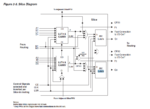snipex
Junior Member level 3
So I'm working on an SPI module on FPGA. To control this SPI module I wrote a state machine.
The state machine resets itself after it falls into unknown state. This is a wanted behaviour but it happens too often.
I tried everything to fix this but nothing works.
Any ideas would be helpfull.
Code:
SPI_u:
SPI_u_ctrl(state machine) :
The state machine resets itself after it falls into unknown state. This is a wanted behaviour but it happens too often.
I tried everything to fix this but nothing works.
Any ideas would be helpfull.
Code:
SPI_u:
Code:
library ieee;
use ieee.std_logic_1164.all;
use ieee.std_logic_unsigned.all;
use ieee.numeric_std.all;
entity SPI_u is
port( sclk: in std_logic;
mosi: in std_logic;
miso: out std_logic;
spi_ss: in std_logic;
RX_Data: out std_logic_vector(7 downto 0);
busy: out std_logic;
trdy: out std_logic;
rrdy: out std_logic;
roe: out std_logic;
reset_n: in std_logic;
TX_Data: in std_logic_vector(7 downto 0);
TX_load_en: in std_logic;
RX_req: in std_logic;
CLK: in std_logic
);
end SPI_u;
architecture rtl of SPI_u is
signal mosi_reg: std_logic_vector(7 downto 0):=x"FF";
signal miso_reg: std_logic_vector(7 downto 0):=x"FF";
signal mosi_s: std_logic;
signal miso_s: std_logic;
signal sclk_s: std_logic;
signal sclk_2s: std_logic;
signal spi_ss_s: std_logic;
signal bit_counter: unsigned(3 downto 0):= "0000";
signal rrdy_s: std_logic;
signal trdy_s: std_logic;
signal sclk_state: std_logic:= '0';
signal first_flop: std_logic;
signal second_flop: std_logic;
signal third_flop: std_logic;
signal rising_edge_sclk: std_logic;
signal falling_edge_sclk: std_logic;
begin
mosi_s <= mosi;
miso <= miso_s;
spi_ss_s <= spi_ss;
ris_edge_det: process(CLK)
begin
if rising_edge(CLK) then
first_flop <= sclk;
second_flop <= first_flop;
third_flop <= second_flop;
end if;
end process;
shift_reg: process(CLK)
begin
if rising_edge(CLK) then
if spi_ss_s = '0' then
if first_flop = '1' AND second_flop = '0' then
mosi_reg(7 downto 1) <= mosi_reg(6 downto 0); --Shift register for MOSI
mosi_reg(0) <= mosi_s; --MOSI register input
bit_counter <= bit_counter + 1;
miso_reg(7 downto 0) <= miso_reg(6 downto 0) & '0';
elsif first_flop = '0' AND second_flop = '1' then --sclk_s
--miso_reg(7 downto 0) <= miso_reg(6 downto 0) & '0';
end if;
end if;
if bit_counter = "1000" OR reset_n = '0' OR spi_ss_s = '1' then --Clear bit counter
bit_counter <= "0000";
end if;
if rrdy_s = '1' AND RX_req = '1' then --Latch data to RX_data when requested
RX_Data <= mosi_reg;
elsif reset_n = '0' then --Reset condition
RX_Data <= x"0F";
mosi_reg <= x"00";
end if;
if TX_load_en = '1' AND trdy_s = '1' then --Load data to miso_reg when register is available and TX_load_en
miso_reg <= TX_Data;
elsif reset_n = '0' then --Reset condition
miso_reg <= x"00"; -----------------####################------------------
end if;
if RX_req = '1' OR reset_n = '0' then --Register overflow status
roe <= '0';
elsif rrdy_s = '1' AND bit_counter = "1000" then
roe <= '1';
end if;
if TX_load_en = '1' then --Status register for MISO reg
trdy_s <= '0';
elsif bit_counter = "1000" OR reset_n = '0' then
trdy_s <= '1';
end if;
if RX_req = '1' OR reset_n = '0' then --Status register for MOSI reg
rrdy_s <= '0';
elsif bit_counter = "1000" then
rrdy_s <= '1';
end if;
end if;
end process;
busy <= NOT spi_ss;
rrdy <= rrdy_s;
trdy <= trdy_s;
miso_s <= miso_reg(7); --MSB bit of MISO reg always ready on MISO line
end rtl;SPI_u_ctrl(state machine) :
Code:
library ieee;
use ieee.std_logic_1164.all;
use ieee.std_logic_unsigned.all;
use ieee.numeric_std.all;
entity SPI_u_ctrl is
port( RX_Data: in std_logic_vector(7 downto 0);
busy: in std_logic;
trdy: in std_logic;
rrdy: in std_logic;
roe: in std_logic;
RST: in std_logic;
TX_Data: out std_logic_vector(7 downto 0);
TX_load_en: out std_logic;
RX_req: out std_logic;
PWM: out std_logic_vector(7 downto 0);
Command: out std_logic_vector(7 downto 0);
clk: in std_logic;
reset: out std_logic;
rrdy_o: out std_logic;
trdy_o: out std_logic;
state_o: out std_logic_vector(3 downto 0)
);
end SPI_u_ctrl;
architecture rtl of SPI_u_ctrl is
signal pwm_s: std_logic_vector(7 downto 0):= x"00";
signal Command_s: std_logic_vector(7 downto 0):= x"00";
type state_value is (Reset_SPI, Wait_s, Wait_RRDY, PWM_latch, Wait_2, Wait_RRDY2, Command_latch, Wait_comm, Wait_dummy, Wait_clk1, Wait_clk2);
signal state, next_state: state_value;
attribute syn_encoding: string;
attribute syn_encoding of State: signal is "onehot,safe";
signal wait_clk: std_logic:= '0';
begin
next_state_p: process(clk, rst)
begin
if rst = '0' then
state <= Reset_SPI;
elsif rising_edge(clk) then
state <= next_state;
end if;
end process;
state_machine: process(state, rx_data, busy, rrdy, trdy)
begin
next_state <= Reset_SPI;
RX_req <= '0';
TX_load_en <= '0';
case state is
when Reset_SPI =>
state_o <= "0000";
if busy = '0' then
RX_req <= '1'; --Dummy read to clear rrdy
TX_Data <= x"FF"; --First byte to send
TX_load_en <= '1'; --TX load enable
next_state <= Wait_s;
wait_clk <= '0';
else
TX_load_en <= '0';
RX_req <= '0';
reset <= '1';
end if;
when Wait_s =>
state_o <= "0001";
TX_load_en <= '0'; --TX load disable
RX_req <= '0'; --RX_req disable
if busy = '1' then
next_state <= Wait_RRDY;
else
next_state <= Wait_s;
end if;
when Wait_RRDY =>
state_o <= "0010";
if rrdy = '1' then
RX_req <= '1';
next_state <= Wait_clk1;
else
next_state <= Wait_RRDY;
end if;
when Wait_clk1 =>
state_o <= "0011";
next_state <= PWM_latch;
when PWM_latch =>
state_o <= "0100";
pwm_s <= RX_Data;
RX_req <= '0';
if trdy = '1' then
TX_Data <= RX_Data;
TX_load_en <= '1';
next_state <= Wait_2;
else
next_state <= PWM_latch;
end if;
when Wait_2 =>
state_o <= "0101";
next_state <= Wait_RRDY2;
when Wait_RRDY2 =>
state_o <= "0110";
TX_load_en <= '0';
if rrdy = '1' then
RX_req <= '1';
next_state <= Wait_clk2;
else
next_state <= Wait_RRDY2;
end if;
when Wait_clk2 =>
state_o <= "0111";
next_state <= Command_latch;
when Command_latch =>
state_o <= "1000";
command_s <= RX_Data;
RX_req <= '0';
if trdy = '1' then
TX_Data <= RX_Data;
next_state <= Wait_comm;
else
next_state <= Command_latch;
end if;
when Wait_comm =>
state_o <= "1001";
TX_load_en <= '1';
next_state <= Reset_SPI;
when others =>
next_state <= Reset_SPI;
end case;
end process;
PWM <= pwm_s;
Command <= command_s;
end rtl;